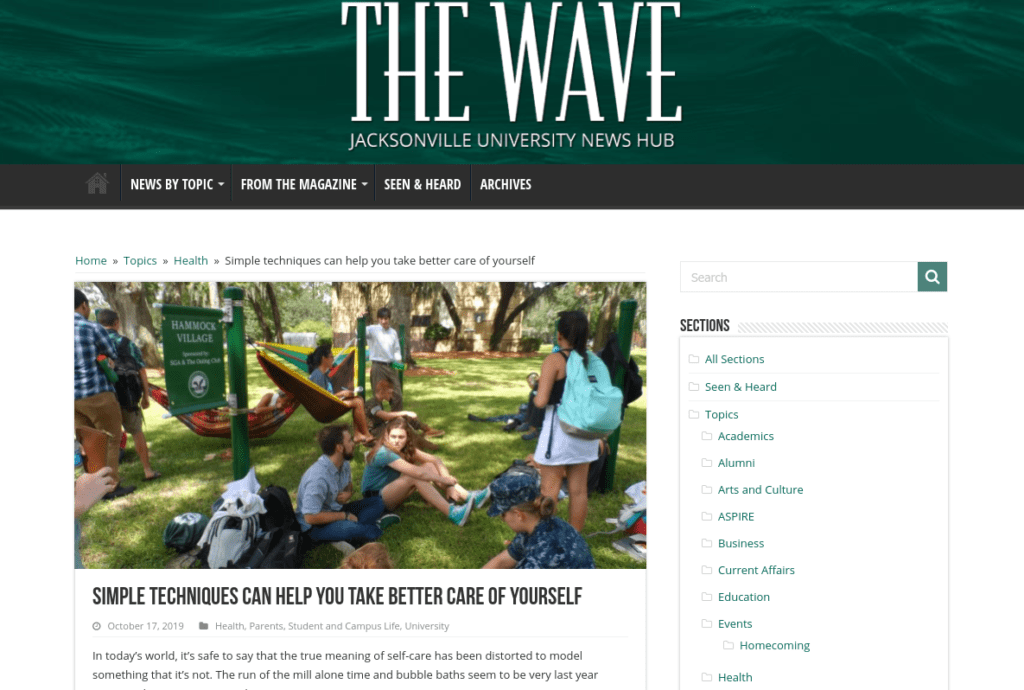A well-designed university website can attract prospective students and serve as a vital resource for current students, faculty, and staff. While a traditional website setup can cover most aspects of a university’s online presence, including a blog—or even multiple blogs—is an excellent way to share updates about the university, highlight campus events, and provide news from individual colleges within the institution.
Aside from being a great way to share ongoing updates, blogs are a terrific way to aid your marketing efforts, improve your site’s search engine rankings and, thus, improve the visibility of your site on the web.
In this article, we’ll discuss six reasons to include a blog on your higher education website and how to get started.
Continue reading, or jump ahead using these links:
An Introduction to Higher Education Blogging
An Introduction to Higher Education Blogging
The role of blogging in higher education is a multifaceted one. It can enhance the usefulness and relevance of your site, as well as connect students, staff, and prospects. Your posts can also act as tools to propel learning opportunities.
Your university blog could span many different categories and topics, from research to insights into campus life to admissions. It can offer career advice, promote university-sponsored activities, or provide a window into specific programs.
Baylor College of Medicine, for example, has a blog titled From the Labs, which features detailed research and the latest news for medical students. The blog is managed by faculty members, many of whom graduated from the College of Medicine:

Not only does this act as a helpful vault of program-related insight, but it also demonstrates the career trajectories of graduates. Students interested in this college can see the cutting-edge research Ph.D. candidates are conducting and feel encouraged about the program’s opportunities.
Colorado State University’s ValuED blog, is geared toward online students. Its categories cover e-learning and training as well as career development:

This is a solid example of how a university can use a blog to help staff and students while simultaneously providing a resource for those considering enrollment in an online degree program.
6 Reasons to Include a Blog on Your University Website
There are many ways to boost the impact of your university website. One effective approach is adding a blog—let’s look at some of the top reasons to consider it.
1. It Can Help With Search Engine Optimization (SEO)
If you want your website to rank well with search engines, it’s important to make SEO a priority. Many factors that influence where your site ends up on results pages – including keywords, links, and unique, relevant content – can be improved through blogging.
New posts add fresh content to your site and drive recurring traffic. Each published piece is an opportunity to boost your position in organic search rankings for a wide variety of different keywords and search terms.
Colorado State University’s site, for example, has blog posts on how to get letters of recommendation. Any student who may be searching for information on how to get letters of recommendation will see their website as the very first result in their Google search. This not only provides exposure for the school but also drives a continuous stream of traffic to the site helping to further boost their search engine rankings.

By creating content that is relevant and valuable to online students and optimizing it with keywords, CSU has achieved greater visibility for itself. Potential graduate students who see this post listed in Google may consider the university as an option for their continued studies.
2. A Blog Provides Opportunities for Personal and Professional Development
Another reason to consider adding a blog to your university website is for the development opportunities it offers both staff and students. As we saw with Baylor College of Medicine, a blog can be a way for faculty to share important industry information.
A blog can also give students easy access to development tools, advice, and resources for personal growth. For example, many colleges share lifestyle and health tips on their blogs:

Additionally, a blog can focus on professional and career advancement. You could post information about upcoming job fairs and internships:

Finally, if students can contribute to a campus blog, it gives them the chance to practice writing and digital communication skills to help build their portfolios. This can be useful in a wide range of areas of study – including the sciences and fine arts – not just journalism or marketing.
3. You Can Share Different Perspectives and Voices from Around Campus
A college blog is a powerful platform for showcasing students’ perspectives and voices. This can be particularly useful for prospective attendees who aren’t able to visit your campus in person but want to get a better idea of what to expect if they decide to attend.
For example, a blog series titled A Day In the Life can extend a unique and engaging glimpse into your college’s culture. Similarly, posts highlighting student and staff achievements can shed light on the opportunities available on campus.
University environments always have something going on and so there is an almost endless well of topics and inspiration from which to draw from for your university site. By letting students contribute to your school’s blog, you aid in their learning experience and secure a steady stream of relevant content.
4. Attract Potential Students to Your University
When students are researching colleges and universities, the first place most of them will look is the internet. This is why SEO is so vital.
Beyond increasing your visibility on Search Engine Results Pages (SERPs), a blog can help attract potential prospects by giving them a more in-depth look into campus life. Most university websites have admissions and application sections that explain some basic information. A blog can, however, help your college stand out from other options through the unique topics, stories, and voices you feature. Prospective applicants can read about real-life student and staff experiences, which helps them feel more connected to your school and envision themselves there.
Another way a blog can help attract new leads is by incorporating Calls to Action (CTAs) on blog pages and posts. You can make it easy for interested parties to share their contact details so you can quickly follow up with them:

SEO can help bring potential students to your website. However, once they’re there, it’s your content that will or won’t pique their interest.
5. Fuel Your Social Media Presence
Your university website isn’t meant to be an echo-chamber, containing materials that only relate to enrolled students and staff. Incorporating blogs is a great way to make sure your site has appeal to a wider audience and it is a source of material that is perfect for use on social media to help you reach a broader audience.
Sharing valuable content across several networks instantly increases your school’s exposure and is a fairly simple way to promote your university, upcoming campus events, and academic programs:

Regularly posting on social media can help boost your university’s online presence, credibility, and reputation. Additionally, including social icons on your university blog posts for quick sharing will prompt visitors to share your content. This can help create backlinks that will further improve your site’s SEO.
6. Address and Answer Specific Questions
Many of the questions college admissions offices receive are repetitive. While a Frequently Asked Questions (FAQ) page can be helpful, a blog is sometimes a more effective method of addressing common issues in more detail. The topics could range from application instructions and tips to choosing an area of study to career trajectories and beyond:

People who want answers often turn to the internet to find them. Writing content that addresses common questions and concerns can help position you as a valuable, trustworthy resource while driving visitors to your site.
How to Add a Blog to Your University Website
Once you’ve made the decision to add a blog to your higher education site, the next step is deciding how to go about it. It’s important to choose the right Content Management System (CMS) to make creating, maintaining, and managing your posts as simple as possible.
One way to go about this is partnering with a platform that specializes in website and content management specifically for colleges and universities. At CampusPress, we offer WordPress solutions for institutions of higher education:
If you want to add a blog to your existing university website, we can help you do so quickly and efficiently. Our services don’t stop there, however. We also provide unlimited support to both staff and students, as well as user guides, training materials, and much more.
We also take care of hosting and security. Just get in touch for a free trial to learn more about your options for adding a blog to your university website.
Conclusion
Establishing a strong online presence is important for universities and colleges. A website that includes one or more blog pages is a valuable tool in accomplishing your university’s online goals. Blogs boost traffic, boost search engine result placement, increase links and sharing, provide information for recruits and current students, and much more.
If you have any questions about how to add a blog on your university website, contact us. We’d be happy to help!